

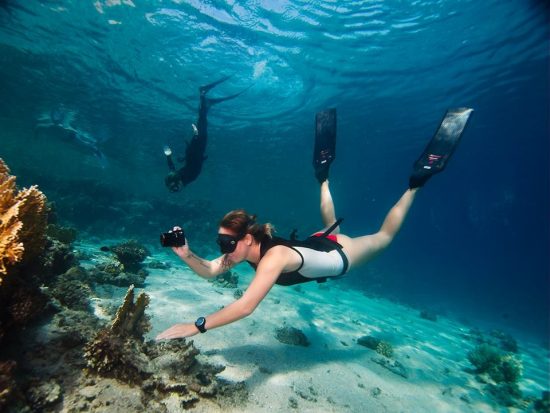
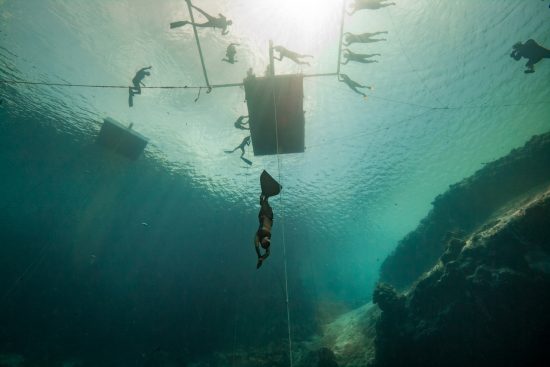
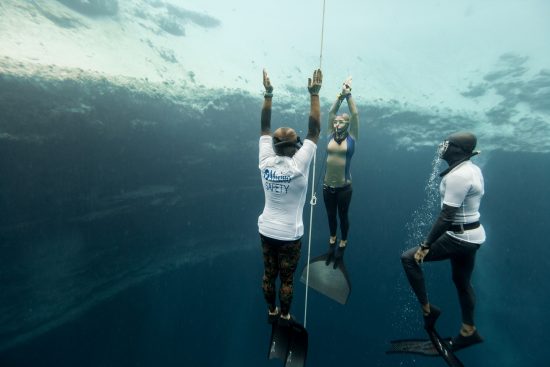
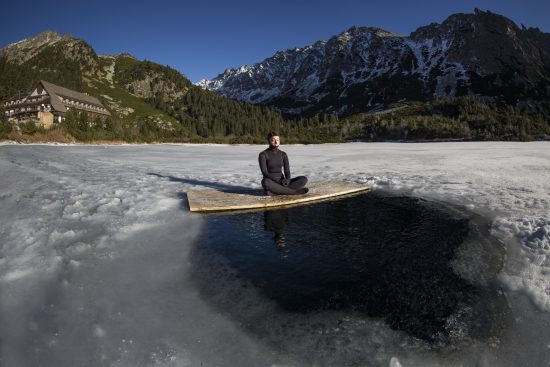
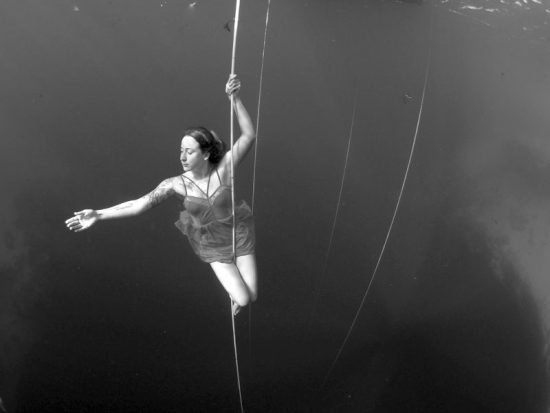
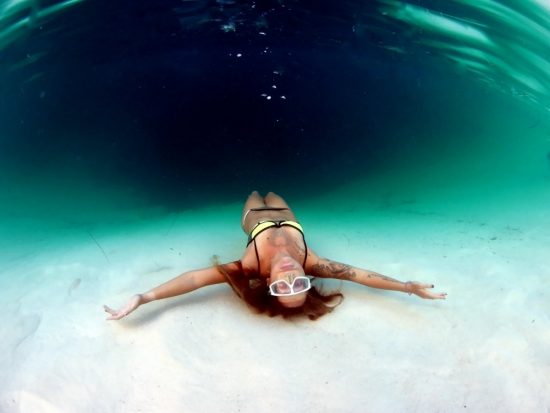
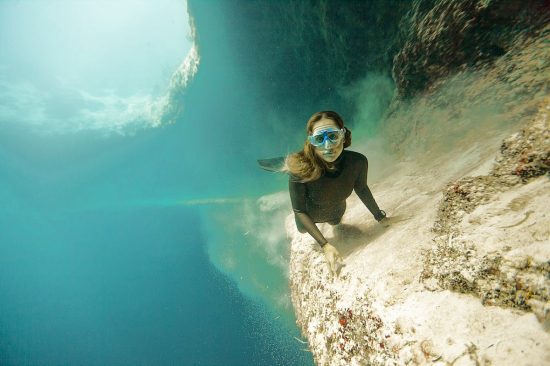
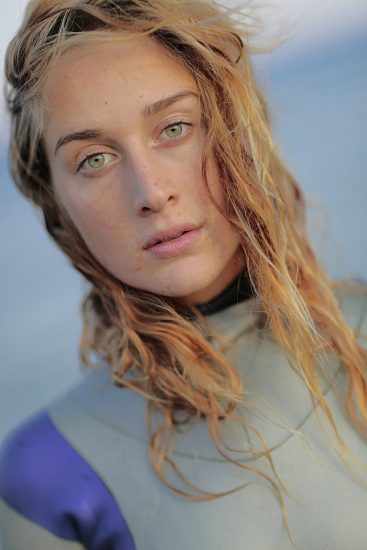
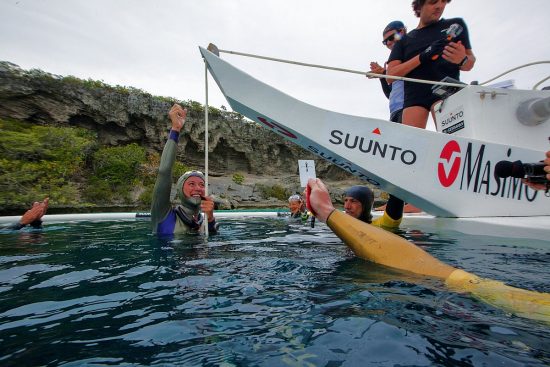
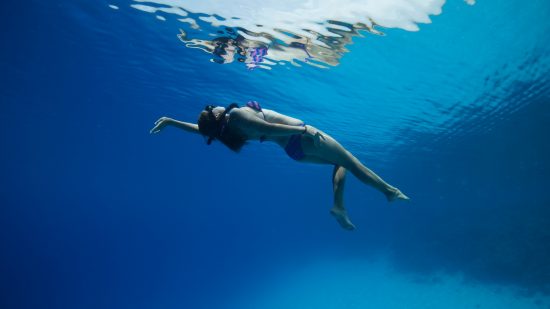
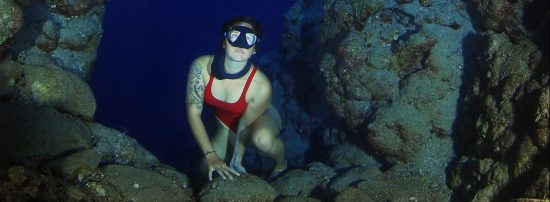
A rising star
Katarina Linczenyiova is a rising star in the world of freediving,
although she is relatively unknown in Western Europe. We met this
fascinating woman recently at the Spring Academy in
Krk, Croatia.
Interview Harald Mathä/Taucher.Net
Taucher.Net (TN): Hi Katie, I am very happy to interview you. Can you tell us something about yourself?
Katarina Linczenyiova (KL): I am the official representative in
freediving for Slovakia. I focus on the sport of deep freediving. Apart
from training, I also study sport sciences and I do research in
ecopsychology. I am a motivational speaker, expedition leader and a
coach for stress management. I am involved in several ocean
conservation projects and movies. But, most of all, I love the sea and
adventure!
TN: Which book are you reading at the moment?
KL: I am reading The Biology of Love by Arthur Janov. The main idea of
the book is that pre-birth experiences and a traumatic birth are
imprinted into our nervous systems, resulting in psychological and
psychosomatic diseases in later life. After birth, the infant needs to
feel loving care, as the lack of love can be as injurious as the lack
of oxygen. I would recommend this book to everyone, not just
psychologists!
TN: What´s your favourite animal?
KL: (smiles) To be perfectly honest, my favourite animal is the
kangaroo. Kangaroos are great, the way they hop all around. But when it
comes to the underwater world, I love turtles. I like that moment when
the turtle goes up to the surface to take a breath, it reminds me of
myself when I ascend from a deep dive or the birth of a child when it
takes its first breath. It is sort of like a rebirth.
TN: What are your aims in life?
KL: I want to live a happy and fulfilled life, doing what I love. I
want to improve as an athlete and understand sports science and
evolution in greater depth. I also love art and I am currently working
on my book, so I would like to finish that as well. In general, I
believe that life is about constant learning. So, my aim in life is to
improve in sports, science and art. In doing so, I want to give the
best of me to those who need it ‒ the environment, people, etc.
TN: Do you believe in destiny?
KL: I believe that you create your own destiny. Maybe there is
something like destiny, but it is important not to give up on your
dreams. Just because things don't go as you want them to, you should
not call it “fate” and just accept it.
TN: Who taught you freediving?
KL: I have been trained by some of the best people on the world; for
that, I am very grateful. My trainer is Martin Zajac from the Apneaman
team. He is very strict and calls me lazy but he has somehow helped me
improve my skills without having to say much.
TN: When and why did you start to freedive?
KL: I started diving when I was just nine years old, but I started
freediving when I was 17. I was very unwell back then, spending most of
the time in the hospital. After I tried freediving for the very first
time, I realised that if I could do something like that, I could get my
life on track as well. It basically helped me deal with my illness on a
spiritual level.
TN: Is there anyone you admire?
KL: Yes, my grandfather. Born in the former Czechoslovakia, he was an
architect, jazz player, painter and traveller. He survived WW2 and the
Iron Curtain, and was able to take care of the whole family. During his
years in Algeria, he constructed grand buildings. He was very poor;
however, his love and passion for life and his work was so fulfilling
to him that he was always a very happy and giving person, even when he
was very sick or not paid well for the amazing work he did. I think he
really understood what happiness and love meant.
TN: What an amazing person!
TN: What are your records and achievements?
KL: In 2013, I become the third deepest woman in the world in the
Constant Weight discipline. I am the holder of several national records
for Slovakia, a four-time bronze medallist at the Suunto Vertical Blue
2015 in the Bahamas. And I am the only woman in the world to have
freedived under the ice at altitudes above 2,000 metres.
TN: What was the strangest thing you ever did underwater?
KL: (laughs) If you ask me about the strange things I have done in my
life, even a small book would not be enough to cover them, haha. When I
am underwater, I don't do strange things. I guess I have a good sense
of risk management. But I have to admit it felt pretty strange the time
when we were making a movie and I was asked to dance underwater in
bikinis without a mask or noseclip ‒ and look sexy at the same time.
Such an easy task, trying to look sexy when you are kind of drowning…
TN: What relaxation methods do you use before diving?
KL: I use visualisation and autogenic training. Visualisation is, in my
opinion, an easy technique that anyone can use to master quite quickly
and it does not require a lot of willpower. During visualisation, I
imagine my whole dive, every second and every step I do. In real life,
one dive to 90m with my monofin takes about three minutes. In
visualisation, it can take an hour. I can do that dive 100 times in my
mind and prepare myself for different scenarios. Through it, I can find
out what stresses me and then work out how to handle that emotion.
TN: Spearfishing is perceived very controversially in the german language community. What´s your opinion about it?
KL: Yes, I agree. Not only in Germany, but in the whole of central
Europe as well. I learnt how to spearfish when I was in Australia and
Indonesia. (Frowns) This is a very sensitive topic, so I don't think it
can be properly discussed in a few sentences. My opinion is that if you
do eat fish – for example, because of the fat that you need if you are
an athlete – it is better to go to the ocean and catch your own food,
or to buy fish from locals rather than go to supermarkets and buy fish
that comes from commercial fishing that is literally killing the
oceans. Buying fish from farms is also not a good idea because those
farms often feed antibiotics and hormones to the fish. Hunting
irresponsibly is bad; it does not matter whether it is a big fishing
net from a big boat or a spearfisher who kills everything he sees.
Responsible hunters take only what they need and no more than what is
allowed. The responsible spearfishers take care of the environment and
are supportive of ocean conservation.
TN: What´s your vital capacity and how long can you hold your breath?
KL: My vital capacity is actually only four litres. So small. But I
train my lungs and breathing every day. I believe that it is more
crucial to learn to work with a certain amount of air so you don’t
waste oxygen, rather than to focus on the amount of air. When moving, I
can hold my breath for 3:30min; when not moving, my max is 7min.
TN: Do you also scuba dive?
KL: Yes, I do! I love scuba diving. It is kind of strange to breathe
underwater for me, but I enjoy it. A lot of freedivers don't scuba dive
once they get addicted to freediving, but I am always happy to go scuba
diving. You can enjoy the more interesting smaller macro life way
better. When scuba diving, I see more of the outside world; when
freediving, I see more of what is within me.
TN: Where do you absolutely want to travel to and why?
KL: Antarctica. When it comes to exploration, this is the country I had
always dreamt of. Even as a child, I was reading books about this cold
continent. I want to freedive there with leopard seals, but more
importantly, I would like to do a deep freedive next to the ice walls.
The vertical walls in Antarctica can't be found in the Arctic. It is
such a raw place on Earth ‒ without an owner. Raw places produce raw
feelings.
TN: Thank you very much for the interview!
KL: It was my pleasure!
Information Katarina Linczenyiova
Residence: Bratislava, Slovakia
Age: 23 years
Web: https://katarinalincz.com
 Mares
Mares 10th June 2016
10th June 2016 Bratislava, Slowakei
Bratislava, Slowakei 
